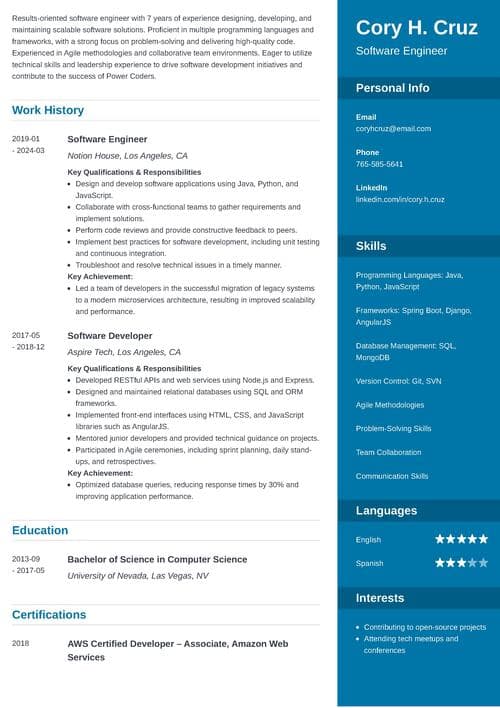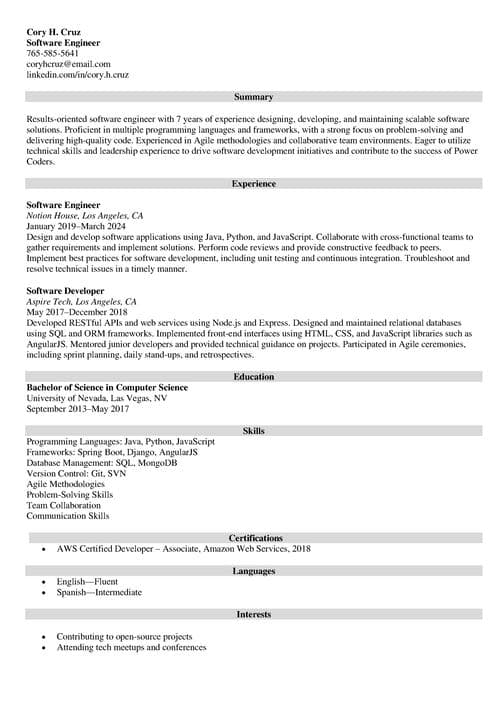Understanding software engineering skills is key to thriving in this ever-evolving industry. In this article, we'll explore the fundamentals of software engineer skills, providing examples of skills for software engineers and various actionable tips. Whether you're a novice or a seasoned professional, focusing on your skill set is always a good idea!
This guide will show you:
- What are software engineering skills?
- A list of essential skills for software engineers.
- How to improve your software engineering skills and competencies.
- How to put software engineer skills on a resume.
Want to save time and have your resume ready in 5 minutes? Try our resume builder. It’s fast and easy to use. Plus, you’ll get ready-made content to add with one click. Explore our free resume templates and start building your resume today.
Sample resume made with our builder—See more resume examples here.
Check out other guides about a career in software engineering:
- Software Engineering Resume Examples + Writing Guide
- Software Engineer Intern Resume Examples + Writing Guide
- Entry-Level Software Engineer Resume Examples + Writing Guide
- Senior Software Engineer Resume Examples + Writing Guide
- Software Engineer Cover Letter Examples + Writing Guide
What Are Software Engineering Skills?
Software engineering skills encompass a range of abilities essential for designing, developing, and maintaining software applications. These skills enable professionals to tackle complex problems, write efficient code, and deliver innovative solutions.
From programming languages to time management, mastering these software engineering skills is crucial for success. Plus, according to the US Bureau of Labor Statistics, jobs in software development are projected to grow by a whopping 25% between 2021 and 2031.
Read more: Learn more about other high-paying skills: Top High-Income Skills to Learn Now
Software Engineer Skills Examples
Understanding the importance of software engineering skills is paramount as they form the foundation of career growth. Let's delve into some key examples of skills needed to be a software engineer:
1. Programming Proficiency
Programming proficiency is the most important hard skill needed for software engineering. It involves writing code and understanding algorithms, data structures, and best practices. Proficiency in programming languages is essential for developing robust and scalable software solutions.
Software engineers can demonstrate their programming proficiency skills by:
- Writing clean, efficient code
- Understanding algorithms, data structures, and best practices
2. Problem-Solving Abilities
Problem-solving skills are at the core of software engineering, demanding analytical skills to dissect challenges and devise creative solutions. Effective problem-solvers excel in breaking down complex issues and delivering high-quality software products.
Software engineers can demonstrate their problem-solving abilities by:
- Analyzing complex issues
- Breaking down problems into manageable components
3. Algorithmic Thinking
Algorithmic thinking involves designing efficient algorithms to solve computational problems. It requires understanding algorithmic principles, data structures, and computational complexity. Mastering algorithmic thinking allows engineers to optimize code for performance and scalability.
Software engineers can demonstrate their algorithmic thinking skills by:
- Crafting innovative algorithms tailored to specific problem domains
- Analyzing and benchmarking algorithm performance to identify optimization opportunities
4. Collaboration and Teamwork
Collaboration abilities and teamwork skills are essential for success in software engineering projects. Effective communication, cooperation, and coordination are crucial soft skills in multidisciplinary teams. Engineers must collaborate seamlessly with team members to achieve project goals and deliver value to stakeholders.
Software engineers can demonstrate their collaboration and teamwork skills by:
- Communicating effectively with team members
- Contributing to group projects with diverse skill sets
5. Version Control
Version control is fundamental for managing code changes and collaborating with distributed teams. Tools like Git enable engineers to track modifications, coordinate development efforts, and maintain code integrity. Proficiency in version control is essential for efficient and collaborative software development.
Software engineers can demonstrate their version control skills by:
- Tracking modifications and maintaining code integrity
- Coordinating development efforts for efficient software development
6. Test-Driven Development
Test-driven development (TDD) is a methodology that emphasizes writing tests before writing code. It ensures software reliability and stability by validating code functionality against predefined criteria. Engineers who practice TDD produce higher-quality software with fewer defects and better maintainability.
Software engineers can demonstrate their test-driven development skills by:
- Writing unit tests for code validation
- Validating code functionality against predefined criteria
7. Agile Methodologies
Agile methodologies promote iterative development, collaboration, and adaptability in software projects. By embracing Agile principles and practices, teams can respond quickly to changing requirements and deliver value incrementally. Agile methodologies foster transparency, flexibility, and customer satisfaction in software development.
Software engineers can demonstrate their agility skills by:
- Adapting to changing requirements and feedback
- Facilitating daily stand-up meetings and sprint planning
8. User Experience Design
User experience (UX) design focuses on creating intuitive and user-friendly interfaces for software applications. It involves understanding user needs, preferences, and behaviors to design compelling user experiences. Engineers with UX design skills can prioritize usability, accessibility, and satisfaction in software development.
Software engineers can demonstrate their user experience design skills by:
- Prioritizing user needs and preferences
- Conducting usability testing and iterative refinements
9. Database Management
Database management is critical for storing, retrieving, and manipulating data in software applications. It involves designing efficient database schemas, optimizing queries, and ensuring data integrity and security. Proficiency in database management enables engineers to build scalable and reliable software systems.
Software engineers can demonstrate their database management skills by:
- Designing efficient database schemas
- Optimizing queries for performance
10. System Architecture
System architecture encompasses the design and structure of software systems. It involves defining components, interfaces, and interactions to meet functional and non-functional requirements. Engineers must design scalable, reliable, and maintainable architectures to support software development and deployment.
Software engineers can demonstrate their system architecture skills by:
- Designing scalable and reliable systems
- Understanding infrastructure and deployment strategies
11. Continuous Integration and Deployment
Continuous integration and deployment (CI/CD) automate the process of building, testing, and deploying software changes. It enables teams to deliver updates rapidly and reliably, ensuring a smooth and efficient development workflow. Engineers proficient in CI/CD practices can streamline development processes and improve software quality.
Software engineers can demonstrate their continuous integration and deployment skills by:
- Automating build and deployment pipelines
- Ensuring rapid and reliable software delivery
12. Technical Documentation
Technical documentation provides essential information about software design, implementation, and usage. It includes design documents, API references, user manuals, and release notes. Engineers must write clear and comprehensive documentation to facilitate understanding, collaboration, and maintenance of software systems.
Software engineers can demonstrate their technical documentation skills by:
- Writing clear and comprehensive documentation
- Facilitating knowledge sharing within teams
13. Time Management and Prioritization
Given the complexity and demands of software projects, time management and prioritization are essential transferable skills for software engineers. Engineers must effectively manage their time, allocate resources, and prioritize tasks to meet project deadlines and objectives. Strong time management and organizational skills enable engineers to maximize productivity and deliver results efficiently.
Software engineers can demonstrate their time management and prioritization skills by:
- Managing project timelines effectively
- Adapting to changing priorities and deadlines to meet project objectives
Pro Tip: Sharpen your programming skills by participating in coding challenges and open-source projects. Continuous practice enhances your problem-solving abilities and exposes you to diverse coding techniques.
Making a resume with our builder is incredibly simple. Follow our step-by-step guide, use ready-made content tailored to your job and have a resume ready in minutes.
When you’re done, Zety’s resume builder will score your resume and our resume checker will tell you exactly how to make it better.
How to Improve Your Software Engineering Skills?
In the fast-paced world of software engineering, continuous improvement is essential for staying relevant and competitive. By honing your skills, you enhance your effectiveness as a software engineer, enabling you to tackle complex challenges and deliver exceptional results.
Here’s how to improve your software engineering skills:
Embrace Lifelong Learning
Stay updated with the latest technologies and trends in software engineering through online courses, tutorials, and workshops. There are plenty of resources available, but to start out, you can check out the courses below to improve your software engineering skill set:
- Introduction to Software Engineering Course by IBM on Coursera
- Software Engineering 101: Plan and Execute Better Software on Udemy
- Software Engineering for Beginner on Udemy
- Software Engineering: Introduction by University of British Columbia
Practice Regularly
Dedicate time to coding exercises, projects, and challenges to strengthen your programming skills and problem-solving abilities. Invest in learning skills that employers are looking for. For example, in 2023, Ruby on Rails was the most sought-after skill, followed by Ruby, Scala, and G. Software engineers skilled in Ruby on Rails received 1.64 times more interview requests.
Seek Feedback
Solicit feedback from peers, mentors, and industry professionals to identify areas for improvement and refine your techniques.
Collaborate With Others
Engage in collaborative projects and team-based activities to enhance your communication, teamwork, and project management skills.
Pro Tip: Build a portfolio showcasing your projects, contributions, and accomplishments. A well-curated portfolio demonstrates your expertise and attracts potential employers or clients.
How to List Software Engineer Skills On A Resume?
When crafting your resume, highlight your software engineering skills prominently to grab the attention of recruiters.
Here's how to put software engineering skills on a resume:
- Create a dedicated skills section listing relevant software engineer skills.
- Showcase your work achievements to prove your skills.
- Tailor your resume to align with job descriptions, emphasizing skills and experience relevant to the position.
Pro Tip: Quantify your accomplishments whenever possible, such as the number of lines of code written, projects completed, or efficiency improvements achieved.
Plus, a great cover letter that matches your resume will give you an advantage over other candidates. You can write it in our cover letter builder here. Here's what it may look like:
See more cover letter templates and start writing.
Working on your software engineering skills is essential for success in the dynamic and competitive tech industry. You can position yourself as a sought-after software engineer by honing your abilities, staying updated with industry trends, and effectively showcasing your expertise.
About Zety’s Editorial Process
This article has been reviewed by our editorial team to make sure it follows Zety's editorial guidelines. We’re committed to sharing our expertise and giving you trustworthy career advice tailored to your needs. High-quality content is what brings over 40 million readers to our site every year. But we don't stop there. Our team conducts original research to understand the job market better, and we pride ourselves on being quoted by top universities and prime media outlets from around the world.





